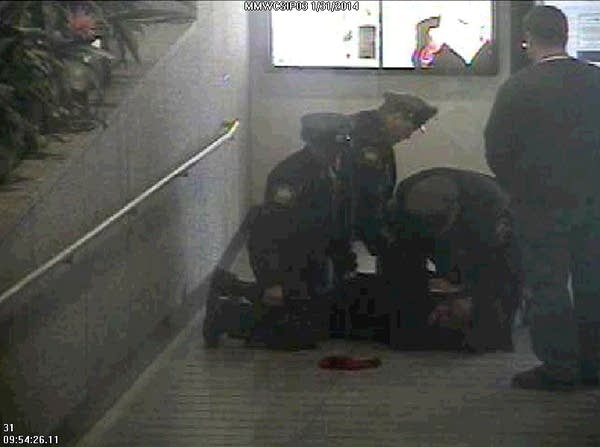Panel questioned after cops cleared in St. Paul stun gun arrest
Go Deeper.
Create an account or log in to save stories.
Like this?
Thanks for liking this story! We have added it to a list of your favorite stories.

Calls are growing to change a St. Paul civilian review panel that recently exonerated police officers involved in a controversial skyway arrest.
Mayor Chris Coleman has invited civil rights advocates to discuss their concerns about the 20-year-old citizen panel, which found that the officers acted lawfully and properly in the arrest of Christopher Lollie. African-American leaders say the process is flawed and needs more transparency.
The St. Paul father, who is black, was confronted last winter by three St. Paul police officers in response to a security guard's complaint that Lollie was sitting in a skyway lounge.
Video: Security camera view of Chris Lollie sitting in First National Bank skyway area
Turn Up Your Support
MPR News helps you turn down the noise and build shared understanding. Turn up your support for this public resource and keep trusted journalism accessible to all.
Police stunned Lollie with a Taser and took him into custody. After Lollie posted a cellphone video of the confrontation on YouTube in August, the incident fed into a national debate about racial profiling and police power.
"That recording of him screaming and hollering when he was tased was heard by probably millions of folks all across the country," said Nathaniel Khaliq, past president of the St. Paul NAACP.
Video: Side-by-side videos of arrest of Chris Lollie in skyway
"I think it put the city of St. Paul and the whole state of Minnesota under the microscope, that, 'Hey, wait a minute. The police departments are no different in the Twin Cities than they are in any other part of the country.'"
Lollie plans to sue the city over his arrest on grounds that the officers used excessive force.
• Related: Police release skyway surveillance video
Khaliq, who thinks the arrest was baseless, notes that the city attorney quickly dropped the charges of trespassing and other infractions after determining Lollie was sitting in a public area of the skyway.
Khaliq was dismayed that the city's Police-Civilian Internal Affairs Review Commission cleared the officers of any wrongdoing. He fought for the creation of the review board in 1994.
"It was established with the understanding that it was a work in progress, and at that some point in time, we could make the necessary adjustments to make it accountable to the citizens that the police department serves," he said.
Jim Scheibel, who was mayor at the time, agrees that the panel he helped form was just a starting point. And the commission has been fine tuned to some extent. A 2001 agreement that grew out of federally mediated talks between the city and community leaders, for example, included an assurance that the review panel would review all citizen-filed complaints.
Scheibel, a professor at Hamline University, said he's heard a lot of talk from his students, who question whether the police acted reasonably when they used a Taser on Lollie.
A big question is whether the panel is doing everything it set out to do.
"I don't know that, but this case is clearly a catalyst to review how might our system work better," Scheibel said.
The panel sustains about 13 percent of all complaints, according to an analysis of city data from the past five years. That seems low to community advocates, but it's higher than the national rate of 8 percent among large state and local law enforcement agencies the Department of Justice surveyed in 2003.
In St. Paul, the panel is made of five civilians and two police officers. They review citizen complaints of excessive force, discrimination, poor public relations, improper procedures and improper conduct. The board also considers cases referred by the mayor or police chief.
An internal affairs investigator from the police department presents a report, and then the panel votes whether the allegation is unfounded, sustained, or not sustained, or whether to exonerate the officers. A fifth option is called "policy failure," in which the allegation is true and the officer followed department procedures - but those procedures turned out to be faulty. The police chief makes the ultimate decision.
Khaliq and others say the process is too secretive, and that the panel members — at least in the Lollie case — didn't use all the tools available to them.
"They should consider implementing the use of an independent investigator," Khaliq said. "They have the power to do that, and also they have subpoena power [to summon witnesses]. But that wasn't done."
Because the panel meets behind closed doors, MPR News couldn't confirm what the panel did or didn't do in Lollie's case.
Mayor Chris Coleman was unavailable to comment on this story. His spokeswoman, Tonya Tennessen, said details of the panel's review must remain private because the commission is governed by state laws that protect private personnel data of officers.
Tennessen said Coleman has reviewed the investigative file, and believes the panel had enough information to judge whether the police officers acted properly.
"The mayor stands behind the decision of this commission, but also stands willing and very open to talking to members of the community about the changes they would like to see going forward," she said. "It was a landmark commission at the time, but maybe it needs to evolve. Maybe it needs to change."
Tennessen said the mayor's office has invited representatives of the St. Paul NAACP and the African American Leadership Council to meet with Coleman and Police Chief Tom Smith in the coming weeks.
Smith won't comment on concerns about the panel until he has the chance to hear directly from community leaders, a department spokesman said.
Dave Titus, president of the St. Paul Police Federation, did not return calls seeking comment Friday.


